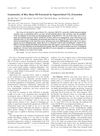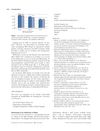 99 citations,
July 2017 in “Clinical Reviews in Allergy & Immunology”
99 citations,
July 2017 in “Clinical Reviews in Allergy & Immunology” New treatments for Alopecia Areata show promise but need to be more effective and affordable.
 98 citations,
February 2013 in “Journal of The American Academy of Dermatology”
98 citations,
February 2013 in “Journal of The American Academy of Dermatology” Dutasteride may help stabilize Frontal Fibrosing Alopecia, but more research is needed.
 60 citations,
September 2013 in “Alimentary Pharmacology & Therapeutics”
60 citations,
September 2013 in “Alimentary Pharmacology & Therapeutics” Immunosuppressive and anti-TNF therapies in IBD patients can increase the risk of skin cancer and cause various skin issues.
 59 citations,
March 2013 in “European Journal of Obstetrics & Gynecology and Reproductive Biology”
59 citations,
March 2013 in “European Journal of Obstetrics & Gynecology and Reproductive Biology” People with polycystic ovary syndrome have a higher chance of having chronic thyroiditis.
 55 citations,
July 2013 in “Dermatologic therapy”
55 citations,
July 2013 in “Dermatologic therapy” Some dermatological medications can impair male fertility, so consult a doctor before trying to conceive.
 35 citations,
May 2012 in “Expert Opinion on Pharmacotherapy”
35 citations,
May 2012 in “Expert Opinion on Pharmacotherapy” The document concludes that there are various treatments for different types of alopecia, but more research is needed for evidence-based treatments.
 34 citations,
June 2014 in “The BMJ”
34 citations,
June 2014 in “The BMJ” Pregnancy can change skin disease severity, with some conditions improving and others worsening, and treatment should balance benefits and fetal safety.
 29 citations,
February 2018 in “European Journal of Immunology”
29 citations,
February 2018 in “European Journal of Immunology” Regulatory T cells are essential for normal and improved wound healing in mice.
 27 citations,
January 2015 in “Current problems in dermatology”
27 citations,
January 2015 in “Current problems in dermatology” The document concludes that primary scarring alopecias cause permanent hair loss, have unpredictable outcomes, and lack definitive treatments, requiring personalized care.
 26 citations,
May 2014 in “BioEssays”
26 citations,
May 2014 in “BioEssays” Using neurohormones to control keratin can lead to new skin disease treatments.
 25 citations,
October 2015 in “Dermatology”
25 citations,
October 2015 in “Dermatology” Dapsone improved pustular psoriasis in patients who didn't respond to other treatments and is considered a well-tolerated option.
 24 citations,
January 2020 in “International Journal of Molecular Sciences”
24 citations,
January 2020 in “International Journal of Molecular Sciences” Some plants with flavonoids may help treat hair loss and promote hair growth.
 16 citations,
January 2016 in “Journal of Investigative Dermatology”
16 citations,
January 2016 in “Journal of Investigative Dermatology” Mice without the IL-6 gene had more hair growth after injury due to higher activity of a related protein, Stat3.
 16 citations,
May 2011 in “Dermatologic therapy”
16 citations,
May 2011 in “Dermatologic therapy” Effective treatments for severe alopecia areata are still lacking.
 9 citations,
April 2021 in “Expert opinion on pharmacotherapy”
9 citations,
April 2021 in “Expert opinion on pharmacotherapy” Clascoterone is a new, effective, and safe acne treatment without systemic side effects.
 8 citations,
March 2021 in “Medicina-lithuania”
8 citations,
March 2021 in “Medicina-lithuania” PRP treatment may promote hair growth and improve hair density in women with AGA, but more research is needed.
 8 citations,
March 2018 in “Expert Review of Respiratory Medicine”
8 citations,
March 2018 in “Expert Review of Respiratory Medicine” Inhalation therapy may repair and protect elastin in the lungs of COPD patients.
8 citations,
January 2015 in “Genetics and Molecular Research” Certain gene variations increase the risk of alopecia areata in Koreans.
 7 citations,
January 2014 in “Biological & pharmaceutical bulletin”
7 citations,
January 2014 in “Biological & pharmaceutical bulletin” Rice bran oil extracted by supercritical CO2 is considered non-genotoxic.
 6 citations,
April 2013 in “International Journal of Dermatology”
6 citations,
April 2013 in “International Journal of Dermatology” Dermoscopy helps diagnose unusual skin lesions like osteonevus of Nanta and can prevent misdiagnosis of serious conditions.
 5 citations,
September 2022 in “Research Square (Research Square)”
5 citations,
September 2022 in “Research Square (Research Square)” CD201+ fascia progenitors are essential for wound healing and could be targeted for treating skin conditions.
 4 citations,
September 2021 in “Frontiers in allergy”
4 citations,
September 2021 in “Frontiers in allergy” The conclusion is that understanding the complex relationship between allergies, autoimmunity, and psychological factors is key to treating skin disorders with itching.
 4 citations,
May 2021 in “Biomedicines”
4 citations,
May 2021 in “Biomedicines” Targeting the protein Caveolin-1 might help treat a type of scarring hair loss called Frontal Fibrosing Alopecia.
 4 citations,
June 2020 in “JAAD case reports”
4 citations,
June 2020 in “JAAD case reports” Permanent hair dye may cause total hair loss.
 4 citations,
May 2018 in “Journal of Neuro-Ophthalmology”
4 citations,
May 2018 in “Journal of Neuro-Ophthalmology” New treatments for relapsing multiple sclerosis are more effective and convenient but have higher risks of serious side effects.
 4 citations,
July 2017 in “Archivum Immunologiae et Therapiae Experimentalis”
4 citations,
July 2017 in “Archivum Immunologiae et Therapiae Experimentalis” Retinol may affect immune responses in people with frequent skin boils.
 3 citations,
May 2023 in “Precision clinical medicine”
3 citations,
May 2023 in “Precision clinical medicine” Researchers found four genes that could help diagnose severe alopecia areata early.
 3 citations,
March 2015 in “Journal of the European Academy of Dermatology and Venereology”
3 citations,
March 2015 in “Journal of the European Academy of Dermatology and Venereology” Some people with primary cicatricial alopecia also have inflammatory bowel disease, suggesting a possible connection.
 3 citations,
March 2005 in “The Journal of urology/The journal of urology”
3 citations,
March 2005 in “The Journal of urology/The journal of urology” Dutasteride may help shrink prostate cancer tumors.
 2 citations,
August 2020 in “Journal of Cosmetic Dermatology”
2 citations,
August 2020 in “Journal of Cosmetic Dermatology” Higher granulysin levels in the blood are linked to more severe hair loss in alopecia areata patients, and these levels decrease after effective treatment.





























